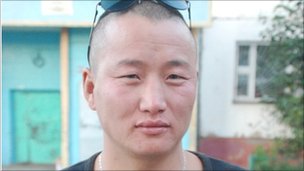 |
| Signs of the far-right movement can be seen in the capital, Ulan Batur |
Erdenebileg Zenemyadar heads far-right group Dayar Mongol
Soronzon Jamsran says the Mongolian nation should remain "pure"
Activists say economic discontent is fuelling violence from far-right groups
By Chris Hogg BBC News, Ulan Batur
On a hillside high above the Mongolian capital Ulan Batur, the Zaisan Memorial commemorates the soldiers who lost their lives in World War II.
Mongolians helped the Soviets defeat the Nazis and, for decades after, Moscow's influence was strongest here.
But these days China pours more money into this country than any other does. Some of it is aid. Some of it is investment.
China's People's Liberation Army has handed over nearly $3m (£1.95m) this year in aid to the Mongolian military.
At a signing ceremony at the defence ministry, senior officers from both countries toasted each other after two generals signed their latest agreement. Everyone smiled.
But some Mongolians are suspicious of these close ties. They want to know what China really wants.
They suspect their powerful neighbour is a bully, not a benefactor, and that such co-operation could, in time, start to undermine the Mongolian way of life.
'Just nationalism'
The signs of their resentment are not hard to find. Swastikas and slogans are daubed on walls across the city.
On the internet the groups show how they are fighting back against what they see as attempts to dilute the Mongolian race.
A YouTube video shows a man shaving the head of a Mongolian woman. Next to her a Chinese man sits with his hands over his face.
It is a very public warning to Mongolian women. This is what happens if you sleep with Chinese men.
It was posted by a member of a far-right group called Dayar Mongol.
Erdenebileg Zenemyadar is its founder. His group's website shows members carrying Nazi flags. The swastika is part of the group's logo.
However, he insists he is a nationalist, not a Nazi. He comes to meet us in traditional dress - the kind of outfit nomadic herders wear out on the steppes.
His organisation is blamed by human rights groups for dozens of attacks on women, foreigners and others they see as threatening the purity of their race.
Violence he condemns, but he defends the shaving of the woman's head.
"I think this is right," he says. "If you ask the Mongolian people what they think about it, the majority of people would support that act."
While he says his organisation does not order or sanction attacks, he offers this explanation for them.
"Young people see foreigners breaking the law and they're not happy," he says. "So they're threatening them, sometimes robbing them. It's wrong but it's happening a lot.
"Sometimes they are our members but the majority are not. Maybe they're our supporters but we don't know them."
One of his members joins our conversation. Soronzon Jamsran is 28 years old. He is an electrician and a new recruit to Dayar Mongol.
He is wearing combat trousers, a black t-shirt and, round his neck, a swastika on a chain.
"In Mongolian we call this the khas symbol," he says.
"Germany's nationalists tried to cleanse their nation, so for me [the swastika] stands for keeping our nation pure. It's not like I support Germany or I'm a Nazi. It's just nationalism."
'Scapegoats'
Robyn Garner, a gay activist in Ulan Batur, is sympathetic to the concerns many Mongolians have about the activities of foreign corporations here.
"You have a large section of the population watching resources, assets being sold off to foreigners," she says.
"I can understand that people are looking for scapegoats, for ideologies to channel their concerns."
But she is worried that the discontent is fuelling the violent agenda of the far-right groups who are targeting her community.
Two transgender women had to flee the country after they were assaulted.
A 19-year-old gay man was stripped and beaten in the suburbs after leaving a monthly gay party.
Otgonbaatar Tsedendemberel, another activist, says he has to be constantly on guard against the threat of attack when walking down the street.
"I'm in constant fear," he says, "and unless we do something it's just going to get worse and worse."
Luvsandendev Sumati, a Mongolian opinion pollster, points out that in the 2008 parliamentary elections, the party associated with these far-right groups won less than 1% of the vote.
They are still operating on the margins, he argues, although he does feel they reflect concerns that many share here.
"Small cultures are dissipating and disappearing," he said.
"It's a real threat. In some ways Mongolian society should react to that. The question is will it react in a civilised way or will it try to go to extremes?"
Some here argue these groups are adopting the symbols of the Nazis because they are not yet a strong enough political force to create their own ideology.
But those targeted by them feel they are a real threat and their influence is growing.
Perhaps that is no surprise. We found one city centre bar filled with Nazi memorabilia.
There were swastikas painted on the floor, reproductions of propaganda posters on the wall, even mannequins dressed in Nazi uniforms.
Inside there were not extremists, just girls on a night out, a couple drinking quietly in one corner - no-one, it appeared, giving a second thought to the idea that these symbols would provoke offence elsewhere.
The threats, the violence, the use of Nazi symbols all help to garner attention for the extremist groups here - Nazis or nationalists, the label does not really matter.
They seem to enjoy the notoriety it brings.
The challenge for Mongolia's authorities will be to address the concerns that fuel their anger and resentment and win them support, while limiting their opportunity to do real harm.










0 comments:
Post a Comment